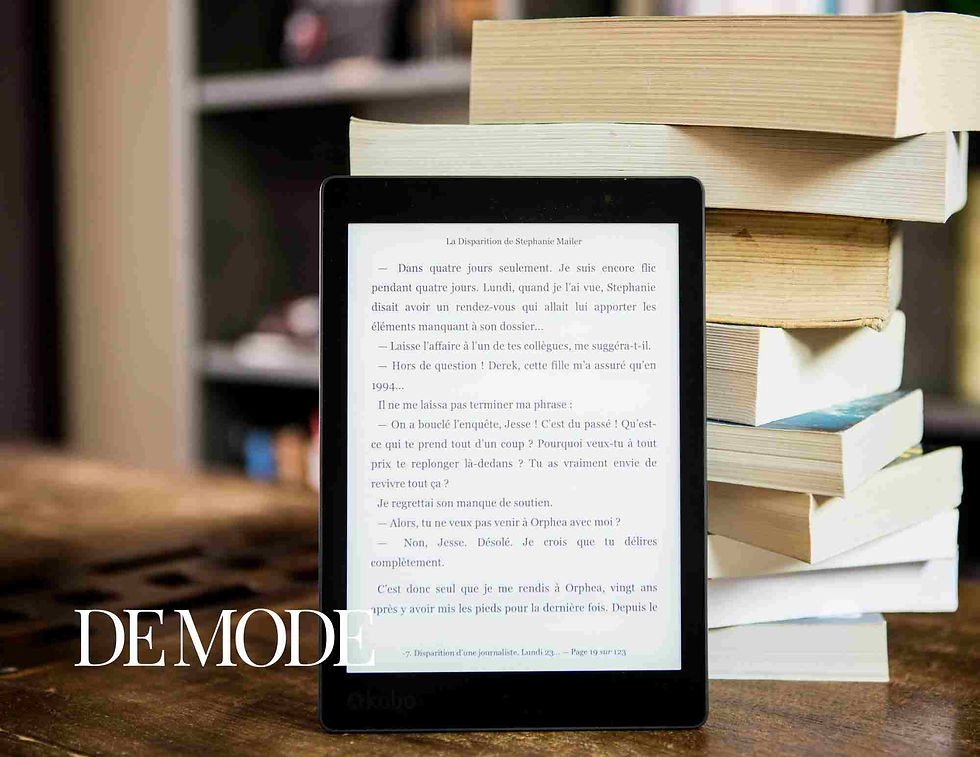"BOOKS AND TECHNOLOGY - THE EVOLUTION OF READING IN THE DIGITAL AGE": DE MODE OF LITERATURE
- DE MODE

- Apr 13, 2024
- 3 min read
ORIGINALLY PUBLISHED IN DE MODE | LITERATURE
Article Published on: 13TH APR 2024 | www.demodemagazine.com
In the age of smartphones, tablets, and e-readers, the way we consume literature has undergone a significant transformation. The digital revolution has not only changed the medium through which we access books but has also revolutionized the very essence of reading itself. This evolution presents a fascinating intersection of technology and literature, raising questions about the future of storytelling, the role of traditional publishing, and the impact on readers' experiences.
The Rise of E-Readers and Digital Platforms
The introduction of e-readers like Amazon's Kindle, Barnes & Noble's Nook, and Kobo has democratized access to literature. These devices offer readers the convenience of carrying thousands of books in a single compact device, making reading more accessible and portable than ever before. Moreover, digital platforms like Apple Books, Google Play Books, and Audible have expanded the range of available formats, including audiobooks and interactive e-books, catering to diverse reading preferences.

The Accessibility of Literature
One of the most significant advantages of digital technology in the realm of books is the enhanced accessibility it provides. Digital formats enable readers with visual impairments to access books through screen readers and other assistive technologies. Additionally, the availability of e-books and online libraries has made it easier for people in remote or underserved areas to access a vast collection of literature, leveling the playing field for global readership.
Interactive and Immersive Reading Experiences
Technology has also facilitated the development of interactive and immersive reading experiences. Enhanced e-books and multimedia platforms incorporate audio, video, and interactive elements, enriching the storytelling process. For instance, enhanced e-books may include author interviews, background music, or interactive illustrations that deepen readers' engagement with the text. These innovations blur the lines between traditional reading and other forms of media consumption, creating a more dynamic and personalized reading experience.
The Role of Social Media and Online Communities
Social media platforms and online communities have become integral to the reading experience in the digital age. Platforms like Goodreads, LibraryThing, and BookBub enable readers to discover new books, share recommendations, and engage in literary discussions with like-minded individuals from around the world. These virtual communities foster a sense of belonging and camaraderie among readers, transforming reading from a solitary activity into a communal experience.

Challenges and Controversies
Despite the numerous benefits, the digital transformation of reading has also sparked debates and controversies. Concerns about digital piracy, data privacy, and the sustainability of e-waste have raised ethical and environmental questions about the long-term viability of digital publishing. Additionally, some readers argue that the tactile experience of holding a physical book and the sensory engagement it provides are irreplaceable aspects of the reading experience that digital formats cannot replicate.
The Future of Reading: A Hybrid Model
As technology continues to evolve, the future of reading is likely to be a hybrid model that combines the best of both worlds – digital and print. While e-readers and digital platforms offer unparalleled convenience and accessibility, physical books provide a tactile and sensory experience that many readers cherish. Publishers, authors, and tech companies are exploring innovative ways to integrate digital and print formats, offering readers greater flexibility and choice in how they consume literature.

Conclusion
The evolution of reading in the digital age represents a complex interplay between technology, culture, and human behavior. While digital advancements have democratized access to literature, enhanced interactivity, and fostered global communities of readers, they have also raised new challenges and ethical considerations. As we navigate this evolving landscape, it is crucial to preserve the intrinsic values of storytelling, creativity, and human connection that lie at the heart of literature. Whether you prefer curling up with a classic novel in print or exploring the latest bestseller on your e-reader, the essence of reading remains a timeless pursuit of knowledge, imagination, and empathy.



Comments